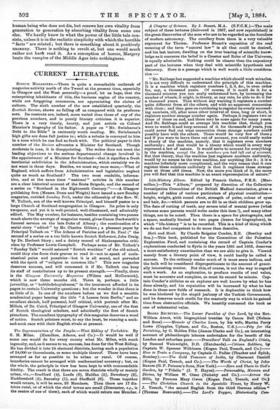"Mr. Babbage has suggested a machine which should work miracles.
It is not very difficult to understand the principle of this machine. It is a machine which registers numbers 1, 2, 3, Sze., in oven order, for, say, a thousand years. Of course, if it could do it for a thousand minutes you can easily understand how, by increasing the. number of wheels, it might, in theory, at any rate, be able to do it for a thousand years. Then without any warning it registers a number- quite different from all the others, and with no apparent connection with them ; and then goes on continuing to register its evenly succeed- ing numbers, till, after some other interval of time, long or short, it registers another strange number again. Perhaps it registers two or three of these on end, and there may be none again for many years. And Mr. Babbage could so arrange this machine that, though yea were to watch it and keep account of it for thousands of years, you, could never find out what connection these strange numbers could possibly have with the others. There would be very few of them; and if you were to leave them out of account, you could easily make a theory of the machine, namely, that it registers even numbers uniformly; and that would be a theory which would in every way represent a law of nature. It would serve to account for everything in the machine, except the few numbers you had left out of account. But that theory, that the machine just registers numbers uniformly, would by no means be the tree machine, nor anything like it ; it is a machine infinitely more complicated, and the very reason that it can register these numbers uniformly is that it registers these strange ones at those odd times. Now, the more you think of it, the more- you will find that this machine is an exact representation of nature."
A Chapter of Science. By J. Stuart, M.A. (S.P.C.K.)—The mairr subject of these lectures (delivered in 1867, and now republished) is the great discoveries of the men who are to be regarded as the founders of modern astronomy. The corollary from them is a very valuable argument for Theism. Professor Stuart's exposition of the real meaning of the term "natural law" is all that could be desired, and his last lecture, dwelling en the true bearing of scientific know- ledge as it concerns the belief in a Creator and Ruler of the Universe, is equally admirable. Nothing could be clearer than the expository part of the lectures when they deal with scientific hypothesis and discovery. Here is a passage which is well worth a little considers. tion
:-


































 Previous page
Previous page